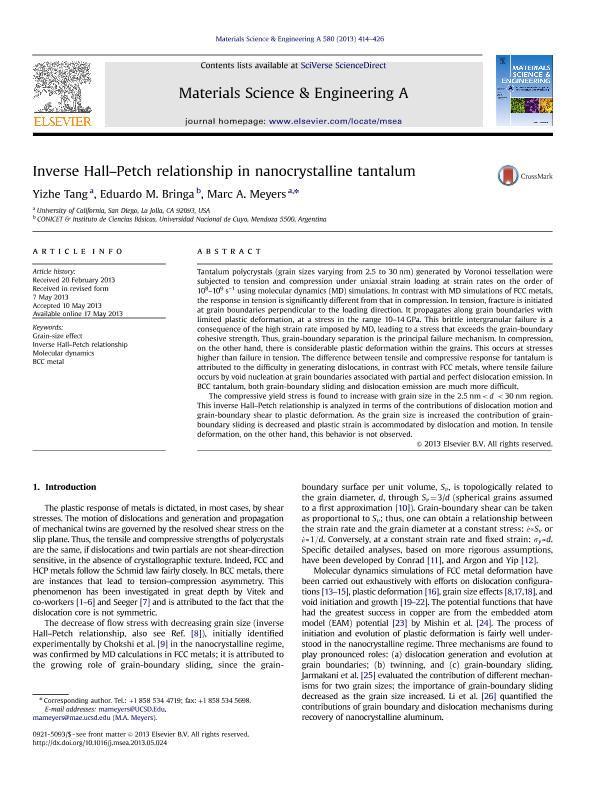Artículo
Inverse hall-petch relationship in nanocrystalline tantalum
Fecha de publicación:
15/09/2013
Editorial:
Elsevier Science SA
Revista:
Materials Science and Engineering A: Structural Materials: Properties, Microstructure and Processing
ISSN:
0921-5093
Idioma:
Inglés
Tipo de recurso:
Artículo publicado
Clasificación temática:
Resumen
Tantalum polycrystals (grain sizes varying from 2.5 to 30 nm) generated by Voronoi tessellation were subjected to tension and compression under uniaxial strain loading at strain rates on the order of 108–109 s−1 using molecular dynamics (MD) simulations. In contrast with MD simulations of FCC metals, the response in tension is significantly different from that in compression. In tension, fracture is initiated at grain boundaries perpendicular to the loading direction. It propagates along grain boundaries with limited plastic deformation, at a stress in the range 10–14 GPa. This brittle intergranular failure is a consequence of the high strain rate imposed by MD, leading to a stress that exceeds the grain-boundary cohesive strength. Thus, grain-boundary separation is the principal failure mechanism. In compression, on the other hand, there is considerable plastic deformation within the grains. This occurs at stresses higher than failure in tension. The difference between tensile and compressive response for tantalum is attributed to the difficulty in generating dislocations, in contrast with FCC metals, where tensile failure occurs by void nucleation at grain boundaries associated with partial and perfect dislocation emission. In BCC tantalum, both grain-boundary sliding and dislocation emission are much more difficult. The compressive yield stress is found to increase with grain size in the 2.5 nmThe compressive yield stress is found to increase with grain size in the 2.5 nm<d <30 nm region. This inverse Hall?Petch relationship is analyzed in terms of the contributions of dislocation motion and grain-boundary shear to plastic deformation. As the grain size is increased the contribution of grain-boundary sliding is decreased and plastic strain is accommodated by dislocation and motion. In tensile deformation, on the other hand, this behavior is not observed.
Archivos asociados
Licencia
Identificadores
Colecciones
Articulos(CCT - MENDOZA)
Articulos de CTRO.CIENTIFICO TECNOL.CONICET - MENDOZA
Articulos de CTRO.CIENTIFICO TECNOL.CONICET - MENDOZA
Citación
Tang, Yizhe; Bringa, Eduardo Marcial; Meyers, Marc A.; Inverse hall-petch relationship in nanocrystalline tantalum; Elsevier Science SA; Materials Science and Engineering A: Structural Materials: Properties, Microstructure and Processing; 580; 15-9-2013; 414-426
Compartir
Altmétricas




